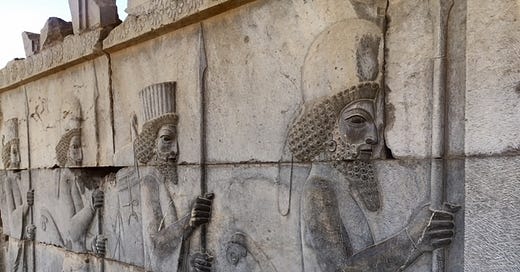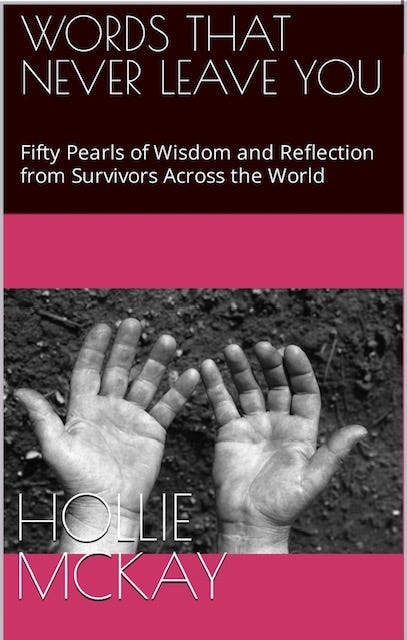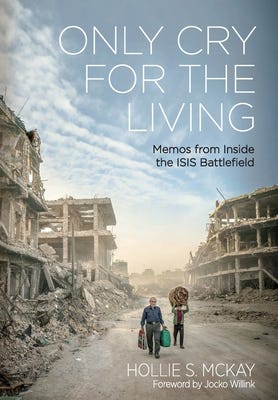What it is really like as a western tourist in Iran: Part Two
Dispatches from the summer of 2017. Part Twoof Two.
In Persepolis – Throne of Jamshid and the once ceremonial capital of the Achaemenid Empire – I marvel at how stories could be told through such detailed grooves into stone, a universal language of intrigue that did not require everyone to understand the same language.
“Alexander conquered the Achaemenid Persian Empire following his victory over the Persian Emperor Darius III at the Battle of Gaugamela in 331 BCE. After looting the palace of all its treasures, Alexander burnt Persepolis to avenge the Greeks and demoralize Darius,” Mahnaz explains. “This is why we do not call him Alexander the Great – just Alexander.”
On another afternoon, we drive under a canopy of blue windless skies through the mountains – stopping for tea and biscuits by the side of the road – to reach the romanticized village of Chak Chak. This means drip drip, the most sacred of the mountain shrines of Zoroastrianism, possibly the oldest religion in the world. Before we make our way on foot up to the steep path to the hallowed fire temple at the top, another tourist – a middle-aged woman from India – comes bouncing toward us.
“Please, if you are menstruating, do not go into the temple,” she says wide-eyed and pleadingly. “It will cause the water to dry up.”
Chak Chak – hence the name – is defined mainly by the ever-dripping spring, veiled behind two giant bronze doors inside a hand-built grotto. Folklore frames these drops as melancholy tears, shed by the mountain in remembrance of Princess Nikbanou, the second daughter of the last pre-Islamic Persian ruler, Yazdegerd III of the Sassanid Empire. Legend has it that she was taken prisoner by the Arabs when she prayed for protection to Ahuramazda, the Zoroastrian God of Good – her invocation answered with a miracle. The mountain opened up, and Nikbanou disappeared inside.
None of us are on our period – at least, I know for sure I am not. In silence, we go into the grotto, replete with floors of marble and walls murky by perpetually blazing fires. I think of the Zoroastrian people I have met scattered across Iraq, targeted by ISIS, living their lives in hiding, fretting for the eventual death of the belief that sustains them.
For another few days, I sleep in small timber cots in graceful bed and breakfasts. I write incessant, almost unintelligible notes to myself in Isfahan, a UNESCO-designated World Heritage Site and the capital of Persia under the Safavid dynasty from 1501 to 1736. It is dotted with imposing boulevards, enclosed bridges, and tiled mosques, the color of the ocean.
To my surprise, we even go to old churches in the Armenian quarter of Julfa. This is the Islamic Republic marketing itself to the tourist drive outside as a beacon of religious diversity. I light candles and sit on steps in sprawling courtyards as bells ring out at the lauded Vank Cathedral, and a few people bow their heads deep in prayer. I ask Mahnaz about Iran’s Jewish population. She assures me that Jews still live here, tucked into a particular quarter. Yet when I request to visit there, she shakes her regretfully to alert me that it could get her into serious trouble.
At night, I see young men and women holding hands and smoking hookah under the moonlight by the water beneath a flaxen-lit bridge. They see me staring and call me over. They find out I am Australian and beg me to find them a way out. Everywhere I go, young people follow me to find out what paperwork they need to live in Australia. I do not have the heart to tell them my birth country is, unfortunately, pretty closed to outside immigration, and the chances of being granted a permanent visa these days are slim. I am surprised they are so bold about their desires to leave and their criticisms of the government. I listen, but I say little. I feel guilty for saying so little, for not commiserating with them. I cannot be sure who to trust.
In hushed tones, the young people tell me they have alcohol and ask if I want a sip. Almost a year ago, I did a story in northern Iraq, driving through the frozen mountains to the Iranian border, watching the old Kurdish men on horses cram their backpacks with counterfeit alcohol bottles from Armenia. For days, I watched them gather supplies for the middleman into Iran, trudging stealthily past the ICRG, risking their lives in the frost and unforgiving terrain, for just a few dollars.
Only this is not smuggled alcohol at all. I sniff the plastic bottle, the sharp whiff of musty odor diluted in coke, prompting me to blanch. I ask to see the original bottle, and one of the boys gleefully pulls it out of his backpack.
“What?” I exclaim more loudly than I had intended. “You are drinking rubbing alcohol?”
To a large extent, Iran is a writer’s dream. It is imbued with history and contradiction, of love and hate, and a modern, fashionable and spirited young society ensnared by an aging religious regime determined to plunder a technology-aspiring generation into draconian times.
On the final leg of the journey, we make our way to the northern Fars Province and its picturesque capital Shiraz, the city of flowers, poets, and literature. My eyes fill with tears at the marble Tomb of Hafez, standing tall in a lush green garden, lauding the cherished poet. My primary school library contained musty-smelling Sufi Persian poetry books, and I devoted hours to poring through the ruminations of Rumi, Saadi, and my favorite – Hafez Shiraz – and their simple expressions of wisdom that transcend the test of time.
Mahnaz points out that a trick of lore is to ask yourself an important question and then close your eyes and open a page of Hafez’s collection. You will find your answer there.
Before I sleep, drifting between roused and dreaming, I ask if that Godly power greater than me will keep me safe and alive for as long as I willfully choose to continue down this line of work. I flip open the Hafez book beside me.
“For I have learned that every heart will get what it prays for most.”
Our time in Shiraz feels too rushed. There is too much to explore in the bold city in too little time. The British women suggest that instead of taking the long, slow, outdated train back to Tehran, we fly back. Mahnaz calls the tour operator and announces that the British are not permitted to alter their itinerary once in the country, but as an Australian, I am allowed. Nevertheless, I go back as planned on the train, and I am glad I did.
Baby blue on the outside, we have our little cabin in the sleeper train with spacious seats and bunk-style cots for the 15-hour sojourn. Suited staff taps on the curtain every few hours, offering simple boxed meals on trays decked with tea, boxed juice, and petite cakes.
From morning to night to morning again, we ramble through the loping Iranian countryside, passing the taupe hills and cattle-freckled farms.
I have yet to check my phone or email for the entire trip. Finally, with a day left, I turn on my VPN. I glance through the intimidating number of emails and see that a representative from the U.S. Citizen and Immigration Services (USCIS) has generously offered for me to come to the New York office for my interview at any time I choose, regardless of whether it is a designated interview day for aspiring citizens.
I eagerly schedule the morning after my return and then wonder with some sadness if I will ever be here again.
I tearfully part ways with the British sisters and Mahnaz, stuffing her palm with hundreds of Rial as a tip. Embarrassed, she tries to give it back, but I keep reminding her she earned it. I hope she can follow her heart to Dubai and be free to grow and dream. I spend my last day and night in Tehran, an incredibly stuffy time in September, walking around the deluged marketplaces and popping in and out of bakeries to take in the rich smells of cardamom, sumac and saffron.
My long flowing abaya sticking to me in the heat, I retire to my hotel room with titled floors and heavy purple drapes to take in Iranian television on the 80’s box affixed with antennas and flowing cords above my hard bed. Hurricane Irma is battering Florida, people are fleeing for their lives, and the death toll is rising. The state-controlled news features several American “experts” meant to present different opinions on the unfolding tragedy. Nevertheless, each professor type conveys hate for the country, and the consensus is that the terrorist U.S. is a disaster zone incapable of caring for its population.
I am comforted to be going home, to have made it through without crossing the wrong path or getting myself into trouble with my rampant question-asking and occasional meanders off the beaten path. I just need to make it through immigration and board that Emirates flight.
The taxi driver to the airport is young and passionate, as is the Persian way. His name is Arash, and his voice is thick with emotion. He has two engineering degrees but laments that there are no jobs, so he drives cabs twelve hours a day. He tells me to tell my people that people are not their government, that they long to live without religious pressures, and that they do not hate America. I nod, but again, I worry about adding my thoughts.
I think about how I was born free. I never had to fight for my freedom. I never had to earn it. Arash talks and talks as though he has never talked – really talked – to another living being for a long time. He laments that sometimes they try to protest against the heavy hand in the street, but that heavy hand comes back ten times worse to hurt them. He explains that to lose the country as it exists, they are willing to lose their lives.
Is anybody there for these young people? Will the U.S. ever be there? Should the U.S. ever be there? Arash wishes me safe travels, writes down his number, and requests I return when Iran is unshackled and that I bring him something from America. I scribble down all I have learned from the past weeks in my notebook in the Tehran Airport waiting room. I underline that there are many things I need to unlearn too.
I have more than two dozen little black notebooks spanning apartments and storage units across America. They are like limbs, extensions of my soul outside of who I am, maps of my unmapped mind. A personal language that I accept over time, my memory will let fade away. I shudder at the thought of ever losing those old-fashioned mementos. The withered black books are my black boxes. Everything that matters lives inside.
I board the plane, perplexed that the seat I selected online is not my seat. I am in a middle seat in the back. Weird. I am too tired to complain. The jet takes off and soars into the still skies. I think of that scene in “Argo,” the relief of being out of Iranian airspace when the steward declares that alcohol can now be served. Tourism, nor journalism, is a crime. I think about when I became so paranoid. Immediately, the suited man next to me by the window introduces himself as Ali and starts hammering with questions about my stay in Iran. He wants to know where I went, what I saw, who I stayed with, and what I talked about.
At first, I try to converse politely as a naïve Aussie backpacker intent on seeing every inch of the planet. His questions grow more intense. I flip it around. I ask Ali what he is doing in Dubai. He doesn’t seem to have an answer and admits he is turning right around to come straight back. He goes back to probing me. I am annoyed, drained. I put my headphones in and feign sleep until we touch down.
“It was nice to meet you, Hollie,” Ali says – more stern than cordial.
“It was nice to meet you too, Ali,” I respond with a sly smile. “And I never told you my name.”
With a little extra drama, I flick my hair and disappear as his jaw drops almost to the floor.
I arrive in New York, crash into my bed, and sleep as I have never slept before. Dead to the world, my bones depleted. The weeks of nervousness are more tiring than running back-to-back marathons. I think long and hard about how millions of people live each day – the people in repressive places pushing against their tyrannical governments. I can only imagine how they deal with every moment knowing they could be dragged into dungeons or even killed at any moment. It takes a special soul to fight for that liberty I never had to earn.
PLEASE CONSIDER A PAID SUBSCRIPTION TO THIS SUBSTACK TO HELP KEEP INDEPENDENT WRITING AND JOURNALISM ALIVE. THANK YOU SO MUCH FOR YOUR SUPPORT.
For speaking queries please contact meta@metaspeakers.org
Follow me on Instagram and Twitter for more updates
HOLLIE’S BOOKS (please leave a review)
** Short read of meaningful lessons gleaned from the ordinary forced to become extraordinary
Order your copy of “Afghanistan: The End of the US Footprint and the Rise of the Taliban Rule” out now.
For those interested in learning more about the aftermath of war, please pick up a copy of my book “Only Cry for the Living: Memos from Inside the ISIS Battlefield.”
If you want to support small businesses:












